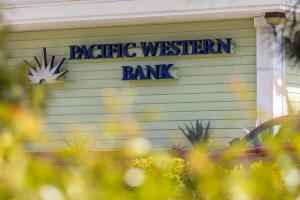|
PacWest dropped 13.6%, a day after the Los Angeles-based
lender's decision to cut its quarterly dividend failed to stem
worries about its financial stability.
The KBW Regional Banking Index had last week touched 30-month
lows after the collapse of First Republic Bank and PacWest's
decision to exploring strategic options.
PacWest and Western Alliance, which have been at the heart of
the banking selloff, saw the steepest decline in deposits in the
first quarter after First Republic, according to S&P Global
Market Intelligence data.
Adding to the banking woes, a Federal Reserve survey, among the
first measures of sentiment across the sector since the recent
run of bank failures, showed that firms of all sizes were
showing less demand for credit than three months ago.
The tightening credit conditions for U.S. business and
households in the first quarter was likely due to the impact of
higher interest rates than the cliff-like decline in credit some
feared after the March collapse of Silicon Valley Bank, Fed's
quarterly survey showed.
"We do expect some credit erosion as the year progresses, but we
also believe the banks have visibility into the outlook and can
manage any credit stresses that emerge," said Jon Arfstrom,
analyst at RBC Capital Markets in a note
Western Alliance dropped 5.5%, while First Horizon Corp and Zion
Bancorp shed 4.4% and 2.9%, respectively, with Arfstrom noting
that the pullback in banks shares overall have made their
valuations attractive.
(Reporting by Medha Singh in Bengaluru, additional reporting by
Bansari Mayur Kamdar; Editing by Arun Koyyur)
[© 2023 Thomson Reuters. All rights
reserved.]
This material may not be published,
broadcast, rewritten or redistributed.
Thompson Reuters is solely responsible for this content.

|
|




